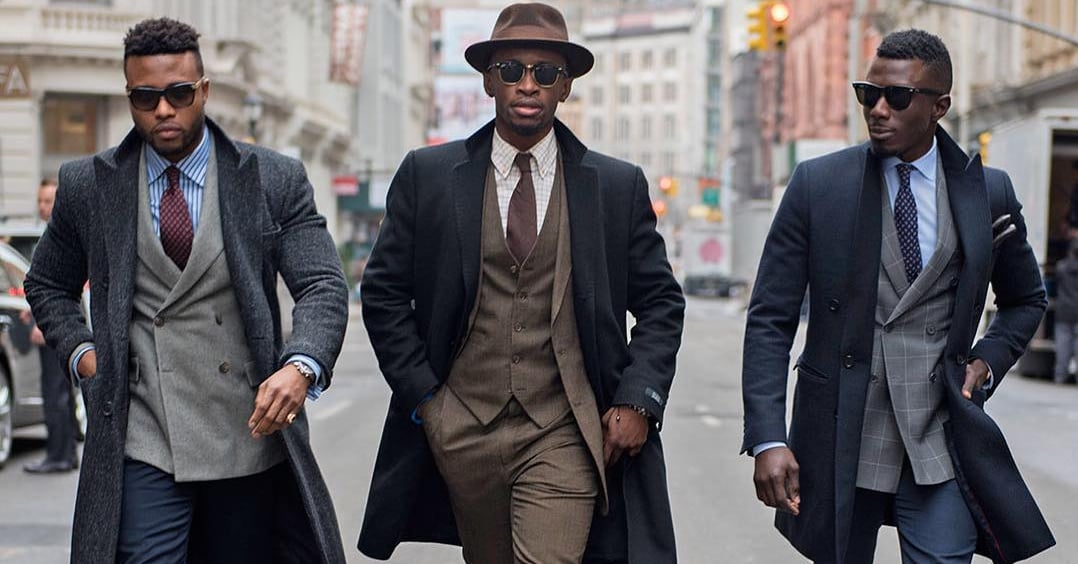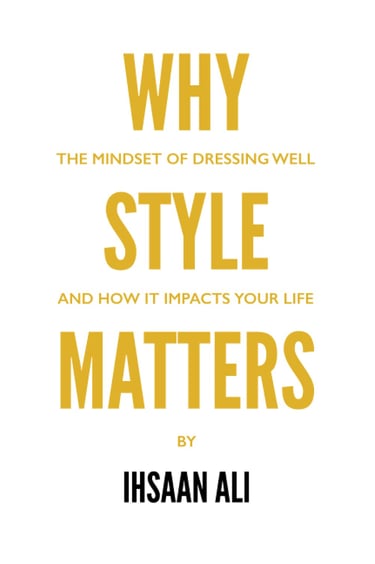Why You Should Dress Well
Discussion about clothing as a form of communication and the benefits of dressing well.
PERSONAL DEVELOPMENT
Jota
8/3/20246 min read


Hello fellow readers, welcome to the blog! Today, we'll talk about what your clothes are saying about you, as the title of this blog suggests. When someone meets you for the first time, one of the first things they notice is how you look. We, as humans, are constantly making judgments in our day-to-day interactions. Often, we notice something and make assumptions or character judgments based on it. For instance, if I’m walking down a dark alley at night and see a figure of a man dressed in black and wearing a hoodie, my mind immediately alerts me to the possibility of a threat. I might act accordingly by getting out of the alley or keeping a safe distance. Now, obviously, I don't know anything about this person, but given the context and the overall look, I make a snap judgment about whether this person is potentially dangerous. We all do it.
Let's try a different scenario. Imagine I'm at a park at noon, and I see an athletic young woman wearing bright clothes running past me. Most people would make positive assumptions about her lifestyle and likability. No one would think it odd if I approached her and asked for her number, even though she is a complete stranger. However, if I’d met her while she was working at a "gentleman's club" and acted the same way, my friends might (THEY BETTER!!) pull me aside and question my life choices.
All that to say that yes, we all judge books by their cover and to be very frank we should. By all means, don’t stop there, but the cover does say a lot about the content of the book, and so does your choice of attire. Depending on the context, it can reveal your personality, social status, and professionalism (or lack thereof).
When I see a woman who is scantily clad or dressed provocatively, I understand that she is communicating—whether she realizes it or not—that she believes that the most valued or important part of her person is her body. I see a few women at my workplace who dress this way, and it garners them the sexual attention they seem to be seeking. However, it is less likely to garner more than just that... sexual attention. Whether you like it or not your clothes say a lot about the inner person, they are a form of visual communication.
Context and Clothing: Communication Through Attire
Clothing is a powerful form of non-verbal communication. It conveys messages about who we are, our intentions, and how we want to be perceived. This is why first impressions are so critical. They set the tone for future interactions and can significantly influence how others perceive and treat us.
Professional Settings:
Dressing professionally at work communicates competence and seriousness. It can affect how colleagues and superiors perceive your work ethic and reliability.
Social Contexts:
In social settings, our attire can signal our personality and lifestyle. For example, athletic wear might suggest an active, health-conscious individual, while fashionable clothing might indicate a keen interest in current trends.
Safety and Trust:
As in the alley scenario, attire and context together help us make quick judgments about safety. This isn’t just about fear but also about trustworthiness, approachability and likeability.
The Implications of Dressing Provocatively
When someone dresses provocatively, it often sends a message that might attract certain types of attention. This isn't about judging moral character but understanding the social cues and the reactions they provoke. For instance:
Attention: Provocative clothing can attract sexual attention, which might be the intended outcome for some. However, this type of attention often comes with its own set of challenges and misconceptions.
Perception: Others might make snap judgements about a person's values or priorities based on their attire. This can affect professional opportunities and social interactions.
Dressing for Special Occasions
When someone dresses sloppily for church, for example, they are communicating that the place and what they are doing that day is not special for them, but banal or common. Why are there dress codes for weddings or funerals? It marks out that event from the daily routine we all engage in. It sets our mind to focus on our behaviour and conduct during that particular function or event . Whether it is armour or a bathing suit, attire helps prepare your mind for the activity you are about to engage in.
Psychological Benefits of Dressing Well
Dressing well has many psychological benefits. It increases your confidence and assertiveness in interactions, especially with strangers. Most of us are familiar with how putting on a dress or a suit, changes the way we think about ourselves and how that changes our own behaviour and consequently how others treat us. When we invest time and effort into our appearance, the benefits extend beyond just looking good. Dressing well has been shown to have a positive impact on our health, both mentally and physically. It’s about treating yourself with respect more than expecting or demanding respect from others.
Good habits in the wardrobe section can easily spread and improve other areas of your life as you start to enjoy putting that little bit of effort into your grooming, your physical and mental health, your finances, and reaping those satisfying rewards. Dressing well helps us establish healthy habits. By prioritizing our appearance, we are more likely to engage in other healthy habits, such as exercising regularly or eating well-balanced meals. Everything feeds together, and these behaviors can contribute to improved physical health over time.
The Social Impact of Dressing Well
By taking the time to choose outfits that make us feel good, we are investing in ourselves and our happiness. When we feel confident and comfortable in our clothing, we are more likely to experience positive emotions throughout the day. This, in turn, can lead to improved mental health and overall well-being. It’s also worth noting that dressing well can positively impact our social lives, which can also impact our overall health and well-being. When we feel good about our appearance, we may be more likely to socialize and engage with others, fostering positive relationships and a sense of community. Not to mention, it helps you attract a romantic partner. You would be surprised about how much your clothes communicate about who you are, what you value, and your personality.
Conclusion
In conclusion, while the phrase "don’t judge a book by its cover" holds some truth, the reality is that first impressions matter, and our attire plays a significant role in shaping those impressions. Dressing well not only influences how others perceive us but also affects our own confidence, health, and overall well-being. By making thoughtful choices about our clothing, we can communicate our values, enhance our self-esteem, and build positive habits that extend into all areas of our lives. So, next time you get dressed, remember that your attire is more than just fabric—it's a powerful tool for self-expression and personal growth.
Understanding the impact of appearance on social interactions underscores the importance of being mindful of how we present ourselves. It not only influences how others perceive us but also affects the quality and nature of our social engagements across various contexts. If you're looking to transform your perspective on personal style and understand its deeper significance, Ihsaan Ali's book "Why Style Matters - The Mindset of Dressing Well And How It Impacts Your Life", which you can find on Amazon, is a must-read. Ali delves into the psychology behind dressing well, illustrating how your wardrobe choices can influence not only how others perceive you but also how you view yourself. With practical advice and insightful anecdotes, this book will inspire you to elevate your style game and embrace the transformative power of dressing with intention. It's more than just fashion—it's about cultivating a mindset that enhances your confidence and overall well-being. See you all soon!



